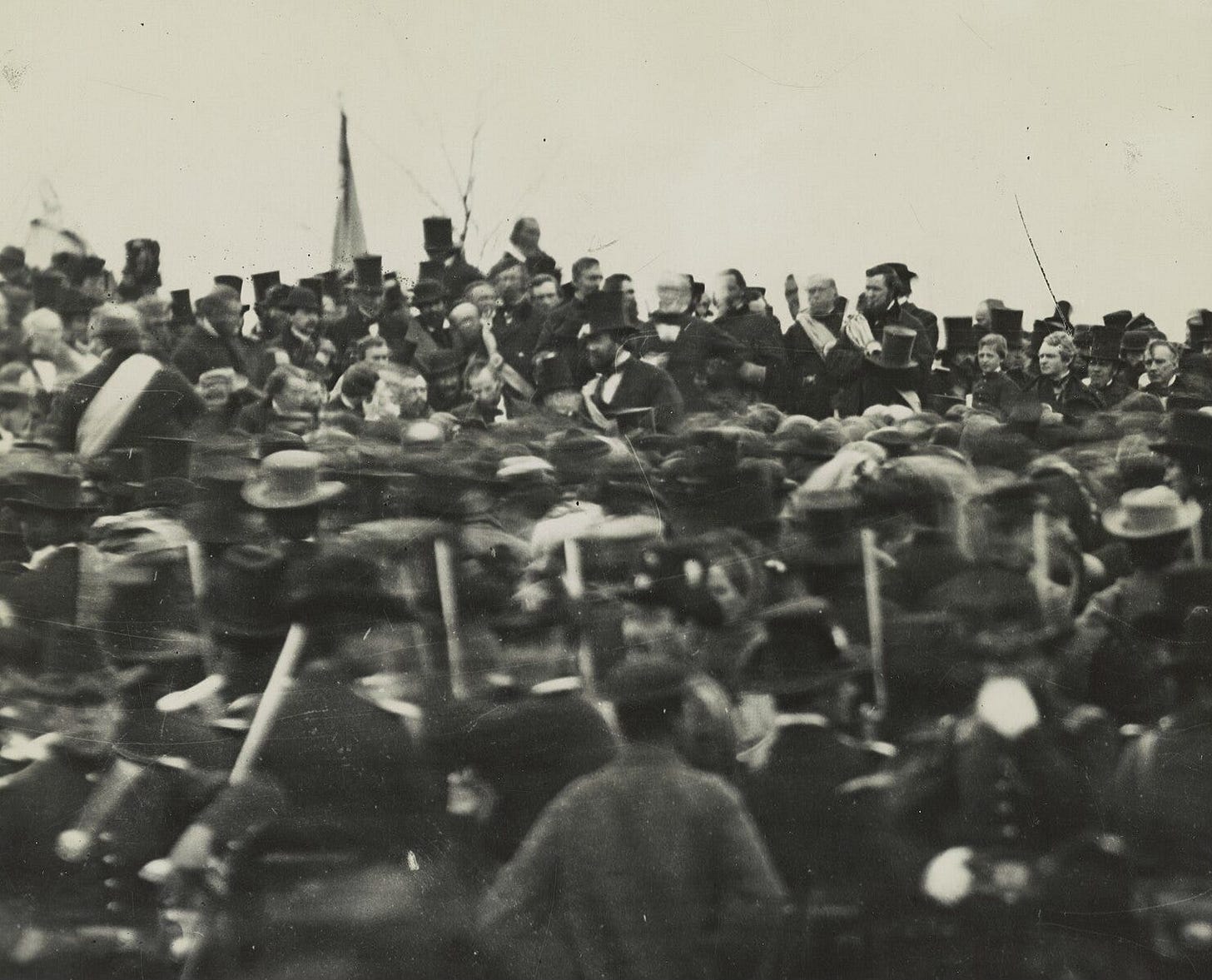November 19, 1863
Gettysburg, Pennsylvania
On October 3, in gratitude for the pivotal Union Army victory at Gettysburg, President Lincoln announced a permanent national Thanksgiving holiday, with the first official celebration to take place on November 26, 1863.
And on November 19, the president traveled to Gettysburg to honor the fallen.
Four score and seven years ago our fathers brought forth on this continent, a new nation, conceived in Liberty, and dedicated to the proposition that all men are created equal.
Now we are engaged in a great civil war, testing whether that nation, or any nation so conceived and so dedicated, can long endure. We are met on a great battle-field of that war. We have come to dedicate a portion of that field, as a final resting place for those who here gave their lives that that nation might live. It is altogether fitting and proper that we should do this.
But, in a larger sense, we can not dedicate—we can not consecrate—we can not hallow—this ground. The brave men, living and dead, who struggled here, have consecrated it, far above our poor power to add or detract. The world will little note, nor long remember what we say here, but it can never forget what they did here. It is for us the living, rather, to be dedicated here to the unfinished work which they who fought here have thus far so nobly advanced. It is rather for us to be here dedicated to the great task remaining before us—that from these honored dead we take increased devotion to that cause for which they gave the last full measure of devotion—that we here highly resolve that these dead shall not have died in vain—that this nation, under God, shall have a new birth of freedom—and that government of the people, by the people, for the people, shall not perish from the earth.
November 19, 1863
San Francisco, California
Mary Ellen Pleasant
I’m not saying I wasn’t moved, reading the address the President gave at Gettysburg. They were beautiful words. No doubt, the man had a way.
But if he thought Southern planters were going to suddenly be reborn to mercy and loving-kindness, the man was blinder than a fence post.
Mere days later, the traitors Asbury Harpending, Rubery and Greathouse were released from Alcatraz as part of a general amnesty by President Lincoln.
They’d spent just four months in the old Broadway jail.
Four months. For high treason.
The whole city was outraged. Greathouse and Rubery were placed on a ship to China. Harpending fled the city.
Did anyone think for a minute that he wouldn’t be back?
And did anyone really think that the South would not be back?
Those were the questions that kept me up at night, at the end of the year. We had a President who was friendly to the South, with Southern in-laws, giving every indication that he wanted the most lenient Reconstruction of the South possible.
A President who could not begin to imagine the depth of hatred and depravity of these rebels he so desperately wanted to re-integrate. Not a clue. Not a God-damn clue.
Can you rehabilitate people who made it standard practice to rape, torture, mutilate and kill?
The South’s whole economy had collapsed. And the President had just freed the people who had been doing all the work.
Did anyone think the slavers wouldn’t be out for revenge?
The Pacific Appeal reported the details of the plans for Provisional Governments to rule the South:
Mr. Ashley, of Ohio, will soon introduce an important bill, providing, in accordance with the suggestions of the President's Message and Proclamation, for the establishment of Provisional Governments over the districts of country in rebellion, and for authorizing loyal citizens in such districts to organize State Governments. The bill of Mr. Ashley confers on the President power to appoint, for every district in rebellion, a Military Governor, who is to exercise the civil administration until the State Government can be formed, and Senators and Representatives to Congress elected. Wherever the people desire the reorganization of the State Governments the Military Governor is to order an enrollment of the loyal electors. As soon as the number of the latter will be equal to one-tenth of the votes of the Presidential election in 1860, the Military Governor shall order the election (if a State Convention, which shall be authorized to form a State Government, prodded it be not repugnant to the Constitution of the United States, or the President's Proclamation of January 1st, 1863, and that slavery be forever abolished and prohibited.
The new Constitution is then to be submitted to the people; and, after its adoption, Senators and Representatives to Congress may be chosen. All laws from the former Constitutions of these districts, making a distinction between Black and White persons, are to be abrogated.
An infringement of individual freedom is to be punished as kidnapping.
Oh, it sounded fine. It sounded like freedom.
But I read it, and I wondered if there was an army in the whole world big enough to protect our people from the slavers’ fury.
Read After the Gold Rush from the beginning:
Alexandra Sokoloff:
I’m a bestselling feminist crime and thriller author —but I also have a commitment and a platform to write about history that isn’t often talked about in the generalizations and most often outright whitewashing and male-washing of history textbooks.
Under this regime, working to counteract the whitewashing and suppression of history is going to be more important than ever.
Why subscribe?
After the Gold Rush is a reader-supported publication. To receive a monthly roundup of new posts and support this work, please consider becoming a free or paid subscriber.
Likes, Shares and Comments are extremely helpful and much appreciated!




